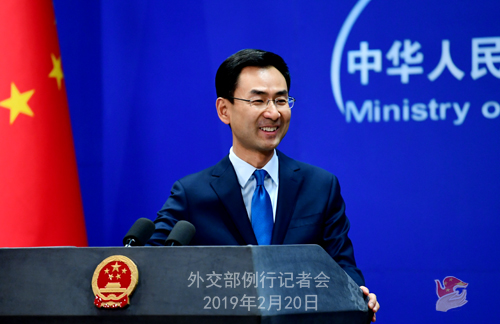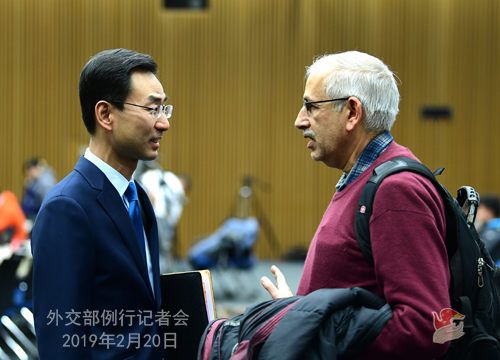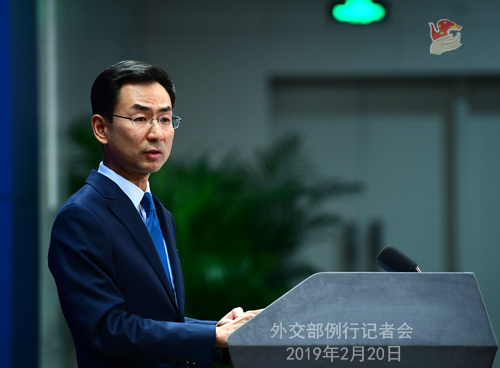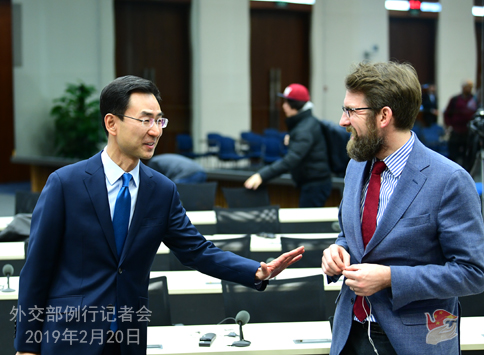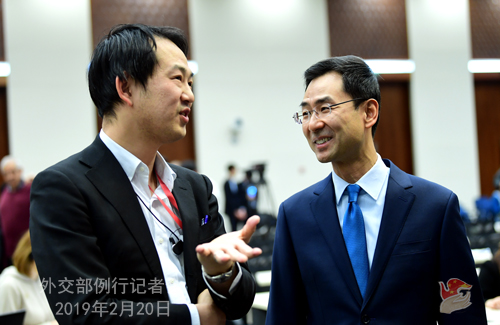| Foreign Ministry Spokesperson Geng Shuang's Regular Press Conference on February 20, 2019 |
| 2019-02-20 20:46 |
|
The 16th Meeting of the Foreign Ministers of China, Russia and India will be held in Wuzhen, Zhejiang on February 27. State Councilor and Foreign Minister Wang Yi will chair the meeting and Russian Foreign Minister Sergei Lavrov and Indian Minister of External Affairs Sushma Swaraj will attend the meeting. China, Russia and India, as major countries and important emerging markets, share common interests and shoulder major responsibilities in promoting world peace, stability and development. Since its establishment more than ten years ago, the China-Russia-India cooperation mechanism has served as an important platform for the three countries to enhance strategic communication, coordinate positions on major issues and seek common ground and cooperation. In November last year, the leaders of the three countries held an informal meeting in Argentina, pointing out the direction for future trilateral cooperation and injecting strong impetus into it. During this meeting, the foreign ministers of the three countries will take the implementation of the important consensus of the leaders as the main thrust and exchange in-depth views on major regional and international issues of mutual interest and deepening third-party cooperation against the current international landscape. We believe that with the concerted efforts of the three parties, the meeting will deliver positive outcomes. Q: According to reports, ROK President Moon Jae-in said in a call with US President Trump yesterday that he hopes the second DPRK-US summit will be a critical turning point for denuclearization, a peace regime on the peninsula and better DPRK-US relations at a substantial level. President Trump also expressed his expectation of "a big outcome" from this summit. We noted that US Special Representative for North Korea Stephen Biegun left for Hanoi to prepare for the leaders' summit yesterday. What is China's expectation for the upcoming summit? A: The Chinese side believes that the direct engagement and dialogue between the DPRK and US leaders are the key to resolving the Korean Peninsula nuclear issue, and we have been supporting the DPRK and the US in resolving issues through dialogue and negotiation. Since last year, there has been a major turnaround in the situation on the Korean Peninsula and the DPRK-US summit in Singapore has broken the deadlock on the Korean nuclear issue. This is the result of the concerted efforts from various parties, which also testifies to China's consistent commitment. We have noted that the working teams of the DPRK and the US are preparing for the upcoming second summit in Viet Nam. We look forward to and support the efforts of the DPRK and the US to further demonstrate sincerity and actively engage with each other. We hope the second DPRK-US summit will be held successfully with positive outcomes and inject new impetus into the realization of denuclearization and lasting peace on the Korean Peninsula. The Chinese side will continue its efforts to contribute to achieving this goal.
Q: Also on the Kim-Trump meeting. Diplomatic sources say that Kim Jong Un will be taking the train from North Korea to Viet Nam. The trip from Pyongyang to Hanoi, I think, will take two and a half days. So there will presumably be plenty of time for Chairman Kim to meet with Chinese leaders. Can you tell us if this is on the agenda, where the meeting will take place, when the meeting will take place and whether or not the meetings might be arranged when Chairman Kim comes back to North Korea after this meeting? A: China and the DPRK share a tradition of exchanging high-level visits. Regarding what you said, I don't have any information. Q: The Nicaraguan government says it has received a 100 million dollar loan from Taiwan. Beijing and Taipei frequently trade accusations of "dollar diplomacy". Does this in the Chinese government's eyes count as "dollar diplomacy" from Taiwan trying to ensure that Nicaragua maintains diplomatic ties with Taipei? A: China is committed to developing relations with other countries on the basis of the one-China principle and the five principles of peaceful coexistence. We hope all countries can recognize the one-China principle, which is a consensus among members of the international community. Q: According to Reuters, a Chinese businesswoman Yang Feng Glan, dubbed the "Ivory Queen", was sentenced to 15 years in prison by a Tanzanian court on Tuesday for smuggling nearly 2 tonnes of elephant tusks . What is your comment? A: I have seen relevant reports. China attaches great importance to the protection of endangered wild fauna and flora and has been strictly fulfilling its international obligations under the Convention on International Trade in Endangered Species of Wild Fauna and Flora (CITES). Domestically, China has put in place a system of laws and regulations featuring the Wild Animal Conservation Law, the Forest Law, and the Regulation on the Administration of the Import and Export of Endangered Wild Fauna and Flora. Since 2015, China has rolled out a series of measures to ban the import and export of ivory carvings and hunting trophies, and domestic processing and sale of ivory for commercial purposes, which has been well acclaimed by the international community. The Chinese government has "zero tolerance" for illegal trade in endangered wild fauna and flora and their products and is resolute in punishing relevant offenders in accordance with law. At the same time, the Chinese government asks its citizens overseas to abide by local laws and regulations and will never shield those who violate laws. We support the lawful and just investigation and trial of this case by relevant Tanzanian authorities. China stands ready to continue its work with Tanzania and other members of the international community to protect endangered wildlife and crack down on illegal trading. Here, I would like to remind Chinese citizens traveling in Africa to bear in mind relevant laws and not to buy or carry with them any products made from rare wild animals like ivories and rhino horns.
Q: You just announced that the RIC trilateral meeting is taking place. But it is taking place in the shadow of a terror attack on Indian paramilitary forces in Kashmir. The Jaish-e-Mohammed group, which is a banned group under the United Nations, has claimed responsibility for this attack. I was wondering what additional proof would China need after this video which was posted by the group to ban Masood, the head of the Jaish-e-Mohammed, as an international terrorist under UN 1267 Committee? A: As I said earlier, the trilateral meeting of the China-Russia-India foreign ministers is an institutional arrangement, and China is the rotating host of the 16th meeting this year. We hope that with the joint efforts of our three countries, it can deliver positive outcomes. Regarding the listing of Masood, there are detailed criteria of the listing of terrorist entities or individuals in the procedures of the UN Security Council 1267 Committee and relevant Security Council resolutions. Following the relevant resolutions and the procedures of the 1267 Committee, China will engage in relevant discussions in a constructive and responsible manner, and keep close communication and coordination with India and other parties concerned. Q: My question is on the China-US trade talks. We have noted that in this round of consultation in Washington D. C., Vice Premier Liu He has a new capacity as the special envoy of President Xi Jinping. What does this mean? Does he have a special mandate this time? A: The Ministry of Commerce has released information on Vice Premier Liu He's visit to Washington D. C. for the seventh round of China-US high-level economic and trade consultations. I answered a question on his visit yesterday, and there is nothing to update you at the moment. I'd like to emphasize that we hope China and the US can work together toward the same goal, and conclude successful consultations that yield win-win outcomes.
Q: Saudi Arabia's Crown Prince Mohammed bin Salman will meet with President Xi tomorrow. Can you tell us what topics China is looking to raise with the crown prince and where you expect those talks to arrive at, in terms of any kind of conclusions? A: Last week I released information on Crown Prince Mohammed's visit to China. According to our current arrangement, during this visit, President Xi Jinping and Vice Premier Han Zheng will meet with Crown Prince Mohammed respectively. Vice Premier Han Zheng and Crown Prince Mohammed will co-chair the third meeting of the China-Saudi Arabia High-Level Joint Committee. In recent years, the comprehensive strategic partnership between China and Saudi Arabia has maintained a sound momentum of development with deepening political mutual trust and fruitful practical cooperation in such areas as energy, infrastructure and space satellite. We hope this visit can further strengthen the China-Saudi Arabia comprehensive strategic partnership, build greater synergy between our development strategies, deepen cooperation in various sectors under the framework of the Belt and Road Initiative, and boost in-depth exchange of views on international and regional issues of common concern, so as to achieve greater progress in China-Saudi Arabia relations in a new historical era. We will release more information in a timely manner. You are welcome to follow up on that. Q: We reported yesterday that the US is seeking to include a reference to keeping the price of the yuan against the dollar stable as part of any agreement in the trade talks. Can you comment on whether the yuan has come out in those discussions? And is it the position of the Chinese government that the yuan is fairly valued? A: Regarding the details of the new round of China-US trade consultations, including items on the agenda, I'd like to refer you to the Ministry of Commerce. As for the RMB exchange rate you asked about, here are some points that I want to make. First, China, as a responsible major country, has made clear its position repeatedly that it does not engage in competitive devaluation. Second, we will not use the RMB exchange rate as a tool amid trade disputes. Third, we hope the US can respect market laws and objective facts, and refrain from politicizing the exchange rate issue. Q: The Bangsamoro Organic Law (BOL) in Muslim Mindanao of the Philippines was ratified in a plebiscite, a result widely welcomed at home. What is your comment? A: The ratification of the relevant law means that under the leadership of President Duterte, the Philippines has taken another important step towards national peace and reconciliation. China welcomes that.
|
 |
|
